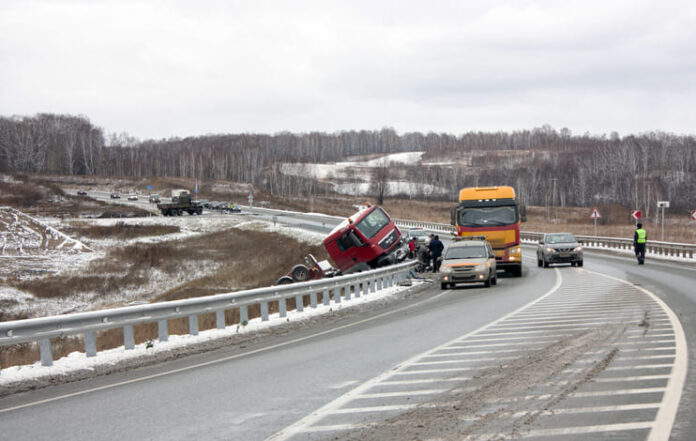Accidents involving trucks are something that no business wants to be associated with since they claim many lives apart from having core legal and financial ramifications. They may affect trucking companies, drivers, or any other entities responsible, with extensive ramifications for both legal liability and financial ramifications as well as reputational damage being severe and long-lasting effects for all involved entities involved.
This article highlights these impacts for business as a whole as well as strategies they can employ in managing these risks more efficiently so they may protect their interests while minimizing long-term damage on operations by managing risks effectively and protecting interests by minimization over time.
Fatal Truck Accidents and Their Legal Implications
Fatal truck accidents occur when commercial trucks are involved in incidents which result in death. These may be caused by factors including driver error, mechanical failure, bad weather or road conditions – or all these together. Legally these accidents often entail complex regulations set forth by organizations like the FMCSA.
They regulate things such as hours of service requirements for drivers as well as maintenance issues with vehicles as part of safety efforts to maintain safe practices – violating any such standards could determine liability claims significantly and legally these cases often come into play to determine liability issues as outlined herein.
Legally, fatal truck accidents are known as “wrongful deaths”, and to determine responsibility the first step should be identifying who was at fault: was the driver negligent, was their trucking company abiding by safety standards, did vehicle malfunction or poor maintenance contribute to causing this fatal incident, etc. These questions all play an integral part as businesses, families and courts deal with the consequences associated with fatal truck collisions. If you were injured in an accident, call the best Houston truck accident lawyer.
Wrongful Death Claims and Legal Liability
After a fatal truck accident occurs, family members or dependents of the victim may file a wrongful death claim against those responsible. Such lawsuits could arise from various factors like negligent driving, failing to abide by trucking regulations, mechanical failure, etc. In trucking accidents however, assigning liability can often be complex; factors like driver, company owner/operator responsibility as well as vehicle manufacturer may all share in its responsibility.
Trucking companies face one primary concern regarding vicarious liability: this holds them liable for their drivers’ actions if they were acting within their employment duties. Businesses may also be held liable for systemic failures such as inadequate training, maintenance issues or failing to monitor driver behavior. Filing wrongful death claims involves investigating of all pertinent circumstances surrounding an accident; gathering evidence proving negligence contributed to its victim’s death and gathering legal documentation of how such factors contributed – all processes which can take time, money and energy from all involved parties involved – time-consuming, costly and emotionally draining for all parties involved.
Insurance and Compensation in Fatal Truck Accidents
One of the first concerns following a fatal truck accident for both businesses and family members alike is insurance. Trucking companies must carry significant liability coverage depending on the nature, size and cargo being transported – this amount can also vary widely depending on operating procedures, company structure and the nature of cargo being carried. Negotiating settlements with insurance providers to minimize payouts can be complex.
Victims’ families typically seek compensation in fatal truck accident cases for medical bills, funeral costs and emotional pain and suffering as a result of such accidents; companies, however, face substantial liability from settlements or verdicts made against them, often for negligence and failure to abide with safety regulations – as well as increased premiums or withdrawal of coverage after such serious accidents occur which add an added financial strain for themselves and their business operations.
Economic Fallout for Businesses
A fatal truck accident can have severe economic repercussions for businesses involved, particularly in transportation or logistics industries. Businesses could potentially incur legal fees, insurance premiums and potential settlements or jury awards should they be found responsible. Furthermore, negligent businesses could suffer significant long-term effects in terms of lost contracts, decreased productivity and disrupted supply chains – among others.
Accidents involving commercial vehicles can also have significant repercussions for business supply chains, affecting vendors, customers, and business partners alike.
Furthermore, companies may experience lasting economic ramifications if linked with fatal accidents; reputational damage could potentially follow clients and consumers away from doing business with an association company associated with an incident that led to death.
Reputational Damage and Public Relations
Fatal truck accidents have the power to destroy both businesses’ financial standing and public relations efforts, along with their reputations.
Negative media coverage, public outrage and consumer doubt can result from such accidents if seen as responsible or negligent; such damage to their image could compromise consumer trust over time and prove difficult to restore.
Businesses need to understand that effective public relations are vital following an accident, with transparency and accountability as being essential elements in rebuilding public opinion after such events. Failing to properly respond can have far reaching ramifications on customer loyalty as well as profits; businesses should devise a crisis comms plan so they are ready for media inquiries in a timely fashion and can offer accurate answers quickly and accurately.
Risk Management and Preventive Measures
Businesses can safeguard themselves from legal and economic repercussions associated with fatal truck accidents by adopting stringent risk management practices.
Trucking companies in particular must make certain their vehicles comply with all safety regulations; driver training plays a pivotal role here too as does monitoring driver behavior to identify unsafe patterns such as speeding, driving under the influence or fatigue – essential elements in risk mitigation for commercial drivers.
Investment in technology can help businesses reduce the risk of accidents. Fleet management systems and telematics, for instance, can monitor driver performance, vehicle condition and hours of service to track driver efficiency; installing collision avoidance systems with lane departure warnings or automatic braking can help avoid accidents before they happen – creating not only reduced liabilities but also an environment which provides safer working conditions and experiences for their drivers and the general public.
Legal Counsel’s Importance in Protecting Businesses
When responding to the aftermath of a fatal truck accident, legal advice can be vital in safeguarding a business’s interests. Specialized law firms offer invaluable guidance through this complex legal environment – helping businesses navigate insurance claims, defend against wrongful death suits and ensure regulatory requirements compliance are all met efficiently by their representation. Employing experienced legal representatives also reduces risk by protecting rights more thoroughly while decreasing potential settlement costs and safeguarding business assets from being compromised in settlement negotiations.
Legal counsel can also help identify areas of risk within a company’s operations and recommend changes that will reduce future accidents. From updating safety protocols, improving driver training or vehicle maintenance practices, an experienced transportation lawyer can offer strategies to mitigate risks and enhance overall safety record of an operation.
Lessons Learned and Future Considerations
A tragic truck accident should serve as a warning sign to businesses to recognize its lessons, assess its legal, financial and reputational ramifications and take appropriate actions to mitigate future risks. By understanding their legal, financial and reputational implications of such events, businesses can improve safety practices while meeting regulatory compliance. They can then ensure they’re ready for any similar situations should another occur in the future.
As trucking becomes an ever more automated industry, changes may occur with safety standards – for instance, greater use of autonomous vehicles and developments in safety technology may become part of its landscape. Companies who keep abreast of trends such as these will be better prepared to manage this changing regulatory and technological climate.
Conclusion
Fatal truck accidents have catastrophic repercussions for all parties involved and businesses of all kinds involved; from legal liability and insurance claims, to reputational damage and financial loss. Businesses should take proactive steps to limit these risks – implement risk management strategies, comply with safety regulations and seek legal counsel experienced enough in trucking accidents – in order to safeguard their interests during these devastating aftermath events and navigate any challenges caused by fatal truck collisions successfully.





























![“Does Everyone Hear Me OK?”: How to Lead Virtual Teams Effectively iStock-1438575049 (1) [Converted]](https://www.europeanbusinessreview.com/wp-content/uploads/2024/11/iStock-1438575049-1-Converted-100x70.jpg)




